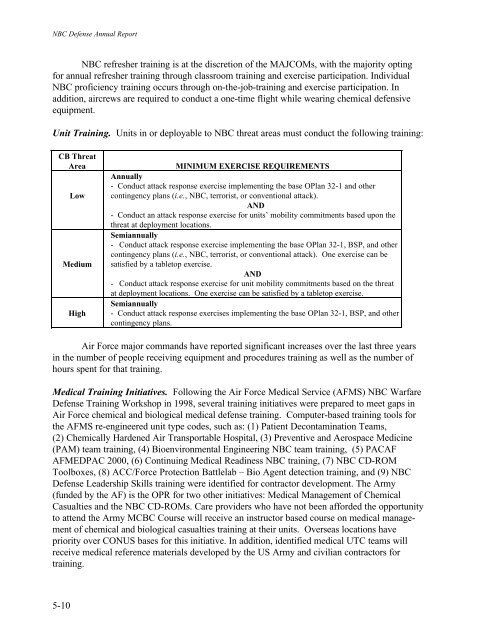Nuclear/Biological/Chemical (NBC) Defense - Federation of ...
Nuclear/Biological/Chemical (NBC) Defense - Federation of ...
Nuclear/Biological/Chemical (NBC) Defense - Federation of ...
You also want an ePaper? Increase the reach of your titles
YUMPU automatically turns print PDFs into web optimized ePapers that Google loves.
<strong>NBC</strong> <strong>Defense</strong> Annual Report<br />
<strong>NBC</strong> refresher training is at the discretion <strong>of</strong> the MAJCOMs, with the majority opting<br />
for annual refresher training through classroom training and exercise participation. Individual<br />
<strong>NBC</strong> pr<strong>of</strong>iciency training occurs through on-the-job-training and exercise participation. In<br />
addition, aircrews are required to conduct a one-time flight while wearing chemical defensive<br />
equipment.<br />
Unit Training. Units in or deployable to <strong>NBC</strong> threat areas must conduct the following training:<br />
CB Threat<br />
Area MINIMUM EXERCISE REQUIREMENTS<br />
Annually<br />
- Conduct attack response exercise implementing the base OPlan 32-1 and other<br />
Low contingency plans (i.e., <strong>NBC</strong>, terrorist, or conventional attack).<br />
AND<br />
- Conduct an attack response exercise for units’ mobility commitments based upon the<br />
threat at deployment locations.<br />
Semiannually<br />
- Conduct attack response exercise implementing the base OPlan 32-1, BSP, and other<br />
contingency plans (i.e., <strong>NBC</strong>, terrorist, or conventional attack). One exercise can be<br />
Medium satisfied by a tabletop exercise.<br />
AND<br />
- Conduct attack response exercise for unit mobility commitments based on the threat<br />
at deployment locations. One exercise can be satisfied by a tabletop exercise.<br />
Semiannually<br />
High - Conduct attack response exercises implementing the base OPlan 32-1, BSP, and other<br />
contingency plans.<br />
Air Force major commands have reported significant increases over the last three years<br />
in the number <strong>of</strong> people receiving equipment and procedures training as well as the number <strong>of</strong><br />
hours spent for that training.<br />
Medical Training Initiatives. Following the Air Force Medical Service (AFMS) <strong>NBC</strong> Warfare<br />
<strong>Defense</strong> Training Workshop in 1998, several training initiatives were prepared to meet gaps in<br />
Air Force chemical and biological medical defense training. Computer-based training tools for<br />
the AFMS re-engineered unit type codes, such as: (1) Patient Decontamination Teams,<br />
(2) <strong>Chemical</strong>ly Hardened Air Transportable Hospital, (3) Preventive and Aerospace Medicine<br />
(PAM) team training, (4) Bioenvironmental Engineering <strong>NBC</strong> team training, (5) PACAF<br />
AFMEDPAC 2000, (6) Continuing Medical Readiness <strong>NBC</strong> training, (7) <strong>NBC</strong> CD-ROM<br />
Toolboxes, (8) ACC/Force Protection Battlelab – Bio Agent detection training, and (9) <strong>NBC</strong><br />
<strong>Defense</strong> Leadership Skills training were identified for contractor development. The Army<br />
(funded by the AF) is the OPR for two other initiatives: Medical Management <strong>of</strong> <strong>Chemical</strong><br />
Casualties and the <strong>NBC</strong> CD-ROMs. Care providers who have not been afforded the opportunity<br />
to attend the Army MCBC Course will receive an instructor based course on medical management<br />
<strong>of</strong> chemical and biological casualties training at their units. Overseas locations have<br />
priority over CONUS bases for this initiative. In addition, identified medical UTC teams will<br />
receive medical reference materials developed by the US Army and civilian contractors for<br />
training.<br />
5-10
















